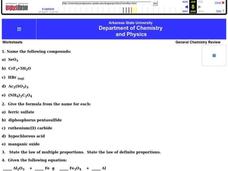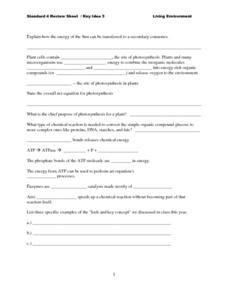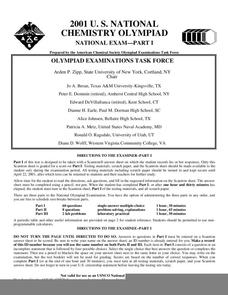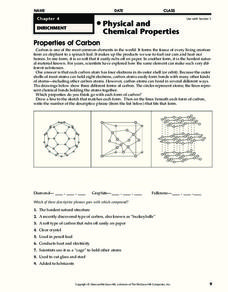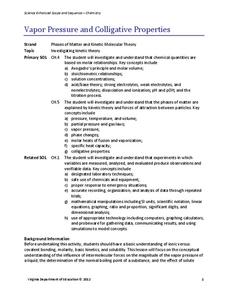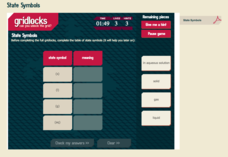Curated OER
Tie Dye
Students practice writing research proposals to test the color fastness of a dye once it has been exposed to a t-shirt. Each proposal needs details of experimental design, length of treatment, and means of cleaning the shirt. All...
Curated OER
Binary Compounds
Binary compounds are explained with the periodic table, atomic charges, and examples. Viewers are taught to name binary compounds and then are presented with a chart of cations and ions. Finally, they see a few photos of forms of silicon...
Curated OER
Balancing Chemical Equations
Ninth graders explain how atoms and molecules form different substances during chemical reactions and how these processes require losing, gaining or sharing electrons. They correctly write chemical formulas and show how a balanced...
Curated OER
Chemical Compounds
In this chemical compounds learning exercise, students write the name of compounds from their chemical formula, balance equations, write electronic configurations for elements, and draw Lewis dot structures. This learning exercise has 8...
Curated OER
Chemical Compounds
In this chemical compounds worksheet, students identify the types of intermolecular forces present in the given substances, calculate the heat required to convert a liquid to gas, and explain the ideal-gas law. This worksheet has 5...
Perkins School for the Blind
Building an Organic Molecule
Glucose is a simple sugar and a molecule that can be illustrated through modeling. Scientific investigators with visual impairments use hands-on models to reconstruct the process of bonding molecules. The tools used in this activity are...
Curated OER
Standard 4-Photosynthesis, Diseases and the Immune System
In this photosynthesis, disease and Immune System worksheet, high schoolers fill in the blanks with key terms to complete sentences about the transfer of energy from the sun to plants, enzymes as catalysts in reactions, homeostasis, the...
Curated OER
2008 U.S. National Chemistry Olympiad Part III
In this chemistry olympiad lab worksheet, chemists are required to design two experiments. In one, they design an experiment to identify seven solutions given to them in pipettes. In the other, they design an experiment to determine the...
Curated OER
2001 U.S. National Chemistry Olympiad Part I
Sixty multiple-choice questions test on a variety of first year chemistry subjects. In order to succeed, exam takers must be competent with properties of elements, stoichiometry problems, gas laws, bond dissociation, and types of...
Chicago Botanic Garden
Are All Plants Created Equal?
Photosynthesis requires energy and produces food, and cellular respiration produces energy and requires food. An interesting lesson analyzes the factors that affect the rates of photosynthesis and respiration. Classes spend one day...
Curated OER
Physical and Chemical Properties
In this length worksheet, students read about the properties of carbon. Students also decide which of the given phrases go with which compound.
Curated OER
Chemical Sleuthing
Students engage in a lesson which includes flame tests and the construction of a simple diffraction spectrograph with which to measure sodium ion emissions. They use the Bragg equation to compute the wavelength of the line spectra produced.
Virginia Department of Education
Mystery Iron Ions
Young chemists perform an experiment to determine if a compound is iron (II) chloride or iron (III) chloride. Then they determine the formula, balance the equation, and answer analysis questions.
National Energy Education Development Project
The Science of Energy
Did you know the word energy comes from energeia, a Greek word? Introduce learners to the four types of potential energy, five types of kinetic energy, and energy transformation with a presentation about where we get our energy and how...
Virginia Department of Education
Vapor Pressure and Colligative Properties
Hate to vacuum, but enjoy using a vacuum pump? Explore a lesson plan that starts with a demonstration of boiling water at various temperatures by using a vacuum pump. Then scholars design their own experiments to measure vapor pressure...
Royal Society of Chemistry
State Symbols
When water is a solvent in a chemical equation, we consider it an aqueous solution. Scholars match the name of four states of matter to their proper symbol in a chemical equation. Four puzzles provide repetition to help pupils remember...
Royal Society of Chemistry
Forensic Tests
Flame tests determine if there is a specific metal in a chemical compound. Young forensic scientists review their understanding of flame tests and hydroxide precipitates by solving puzzles. The timed review encourages mastery.
Biology Junction
Energy Flow in an Ecosystem
Every living thing requires a food source, thus the interconnections in ecosystems become complex. Scholars learn about these interconnections in a presentation on energy flow. It starts with the sun and moves through many different...
Curated OER
Enzymes in Action: An Inquiry Approach to the Effects of Enzymes
Students experiment with enzymes as key components of chemical reactions in all living things through this series of lessons.
Curated OER
Chemical Formulas Unit-Day 4
The purpose of this lesson plan involves reviewing nomenclature and molecular
formulas as well as introducing naming molecular compounds and identifying acids. The students investigate and understand how conservation of energy
and matter...
Curated OER
Interpreting Chemical Formulas
In this chemical formulas activity, students practice naming molecular compounds by their formulas and determine if a gas is a compound or an element. This activity has 13 fill in the blank questions.
Virginia Department of Education
A Crystal Lab
Young chemists grow ionic crystals, metallic crystals, and supersaturated crystals in three different lab experiments. Observing these under a microscope allows pupils to compare the various structures.
Curated OER
Biologically Important Molecules
In this biologically important molecules learning exercise, students fill in the blank with information about carbohydrates, lipids, and proteins. Students also make notes about nucleic acids.
Curated OER
Comparing Covalent and Ionic Substances
In this covalent and ionic substances worksheet, students use the internet to find information about the characteristics of covalent and ionic substance and explain what causes the differences in these types of substances.





